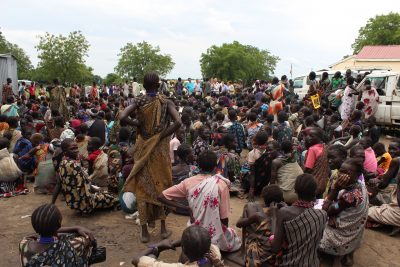By
Peter Louis
Following the looting of the Médecins Sans Frontières (MSF) health centre during fighting on 23, 24 and 25 February in the town of Pibor, South Sudan, the severe limitations of medical care could result in significant avoidable disease and death, warned the humanitarian medical organization.
MSF was able to provide some medical care in the only safe location, the UN compound, but this is not adequate for the scale of the probable needs, both now and in the coming days and weeks.
Although fighting in Pibor has subsided since the evening of 25 February, the situation remains tense, with significant military presence in the now substantially burned town. MSF is still providing medical care within the UNMISS (UN Mission in South Sudan) compound where approximately 1,000 displaced people, mostly children, are continuing to take shelter without access to food, water, shelter or sanitation. One patient, a child suffering from a gunshot wound to the abdomen, has died. A delivery of medical supplies and an additional MSF doctor were flown in yesterday afternoon, 25 February, by helicopter to support the team’s humanitarian response.
“The humanitarian situation in Pibor right now is critical,” says Corinne Benazech, MSF Head of Mission. “With our medical centre severely looted, MSF teams are still working within the UNMISS compound and providing care to the patients we are able to reach. However, we urgently need access to people who’ve been affected by recent violence in the surrounding area. Thousands of people have fled to the bush and have no access to humanitarian assistance. Their condition remains unknown and MSF fears it may be very serious.”
A comprehensive assessment of the extent of the damage to MSF’s medical centre has not yet been possible, but the team on the ground has confirmed that it has been heavily looted. While the current solution – providing medical care in the UN compound – is far from ideal, it is the best option currently available. With heavy fighting approaching the MSF health centre, and a fear of being caught in the crossfire, the MSF team left for the UN area and have since then been providing the best medical care possible in that space. There is, however, a lack of surgical capacity on the ground in Pibor to provide adequate treatment to war-wounded patients, and with thousands of people having fled to the bush it is likely there will be a significant need for treatment of respiratory infections, diarrheal diseases and other health conditions.
“We are a neutral medical organization and we provide medical care on a strictly impartial basis,” says Benazech. “It is ordinary citizens of South Sudan who suffer when our facilities are looted and we are not able to provide life-saving medical care. We strongly condemn the looting of the MSF medical centre and reiterate our call that all armed actors must abide by the laws that protect civilians, medical facilities and the provision of humanitarian assistance.”
MSF provides medical care neutrally and impartially to whoever needs it most, regardless of race, religion, and ethnicity of political affiliation. MSF is providing medical assistance to over 800,000 patients per year in South Sudan. Since the present humanitarian crisis began in December 2013, MSF has provided medical assistance to more than 1.6 million patients across the country.



No Comments Yet!
You can be first to comment this post!